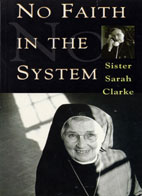In Memory of Sister
by
(
Sister

Sister
Paddy Joe Hill, one of the Birmingham Six she helped free in 1991, described her as “the Joan of Arc of the prisons.” That is a remarkable comparison considering Mark Twain, a Joan of Arc biographer wrote, “she is easily and by far the most extraordinary person the human race has ever produced.”
Yet, the work of exonerating an innocent person takes more than years of tedious work digging up more and more evidence of a conviction being rooting in such things as a police frame-up, perjured testimony, concealment of exculpatory evidence by prosecutors or defense lawyer bumbling. Just as important is maintaining the spirits of a defendant and his or her layperson and legal counsel supporters during the time it takes to accomplish a person's release.
That is where Sister Clarke excelled. During her more than three decades of activism Sister Clarke provided vital behind the scene support for numerous wrongly convicted men and women in British prisons. Among the people she aided were the Maguire Seven, the Birmingham Six and the Guildford Four. Americans are most familiar with the Guildford Four because of Daniel Day Lewis' stirring portrayal of wrongly convicted and imprisoned Gerry Conlin in the 1993 movie: In the Name of the Father. (See Justice Denied movie review, Vol. 2, Issue 4). Sister Clarke is credited with being one of the key people who kept hope alive for the Guildford Four during the time before their case garnered international publicity as a travesty of justice.
Due
to the difficulties of people in
There is no question that Sister Clarke was a “hands on” activist who did her remarkable humanitarian work on a shoestring budget. One prisoner she visited in the 1970s wrote that her hands were oily when she arrived, because she had to repair her car that had broken down on the way to the prison.
Sister Clarke's efforts on behalf of imprisoned people epitomized the fortitude it takes to act on one's beliefs in an unpopular cause, because her actions were often at odds with her religious peers and prison officials.
Billy Power, another one of the Birmingham Six wrote about her:
“Sister
"If
Sister
Sister Clarke's autobiography, published in 1995, summed up her feelings after dealing with the British judicial and prison system for a quarter of a century: No Faith in the System.
Described as gutsy, Sister Clarke’s doggedness may have simply been a byproduct of her living her beliefs. She didn't take the path of simply giving lip service to her professed beliefs when made aware of injustices inflicted on men and women by the British legal and prison system.
Men and women unfairly treated or innocent are entombed in the prisons of every country. So the sense of justice and fair play embodied in Sister Clarke’s more than three decade long struggle to aid prisoners resonates to compassionate people faced with similar problems in their native land. There is not just a need, but a constant shortage of people who exhibit Sister Clarke's willingness to act in the face of ostracism and disappointment in the pursuit of doing what is right. The world was a bit more humane while Sister Clarke was alive, and so her death is a loss for even those people who didn’t have the privilege of having known her.
THE END
Sources:
“In
memory, Sister
“I was in
prison and you came to visit me: Sr.
“When
British Justice Failed,” Kevin Toolis, NY Times,
“Sister
“Saint Joan of Arc,” in “The $30,000 Bequest and Other Stories,” Mark Twain, Harper and Brothers, 1906. At: http://www.boondocksnet.com/twaintexts/saintjoan04.html##